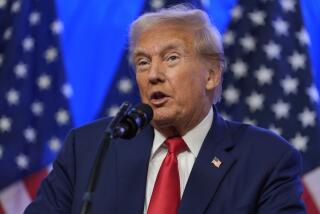Romney tax returns highlight tax code’s breaks for rich
- Share via
Reporting from Los Angeles and Washington — Republican presidential candidate Mitt Romney’s tax returns reveal a sophisticated low-tax investment strategy that includes offshore funds and a now-shuttered Swiss bank account, contributing to a fortune that has emerged as a potential liability in his quest for the White House.
Romney and his wife, Ann, reported more than $40 million in income in the last two years, partly from their investments in foreign jurisdictions long considered tax havens, including the Cayman Islands, Bermuda and Ireland. Campaign officials say Romney gained no tax advantage from those overseas investments.
The former Massachusetts governor released his tax returns Tuesday for the first time after pressure from rival Newt Gingrich, who has sought to portray Romney — who ranks among the top fraction of 1% of richest Americans — as out of step with GOP primary voters.
Romney’s campaign carefully controlled the release, first giving the returns to a select group of news outlets Monday evening before distributing them widely Tuesday, a day that also saw President Obama’s State of the Union address and the Oscar nominations.
Still, that did not appear to blunt scrutiny of his finances. Democrats pounced on details such as the Swiss bank account to further their portrayal of Romney as a high-flying financier.
The documents underscore how Romney, the wealthiest candidate to seek the presidency in recent history, has benefited from a tax code that lets investors pay taxes at a much lower rate than people who earn wages or salaries.
In all, the Romneys paid $3 million in federal taxes in 2010 on nearly $21.7 million in income derived mostly from capital gains and dividends. That is an effective tax rate of 13.9%, far lower than the top 35% marginal tax rate on wages and salaries.
The Romneys expect to pay $3.2 million on $20.9 million in income for the 2011 tax year, for an effective tax rate of 15.4%.
Their money is mostly held in blind trusts that Romney set up in 2003 for himself, his wife and their adult children after he was elected governor. Brad Malt, who controls the three trusts and oversees the investments, said Tuesday that he was barred by law from communicating with the Romneys about the individual investments.
But USC tax professor Edward Kleinbard, a former chief of staff of the joint tax committee in Congress, said Romney still had the right to outline investment strategies and goals to his trustee.
“He could say, ‘I want the investments in the U.S,’ ” Kleinbard said.
While offshore investments may raise eyebrows among the tax-paying public, accounting experts who reviewed the Romneys’ returns said the number of these overseas accounts seemed typical for an investor of Romney’s wealth and sophistication.
“It’s a global economy now,” said Michelle Hanlon, an associate professor of accounting at MIT who studies offshore investments. “As long as the income is reported to the IRS, there is nothing wrong with having an offshore account.
“It’s hard for most people to understand what it would be like to manage that much wealth,” Hanlon added.
Malt said he set up the Swiss bank account in 2003 in Ann Romney’s trust “for diversification.” He said the account at UBS, which is headquartered in Zurich and Basel, contained $3 million before he closed it as Romney was launching his presidential campaign in 2010 and that Romney paid U.S. taxes on the $1,700 he received in interest that year.
“It was a bank account, nothing more and nothing less,” the trustee said. He said he closed it because “it just wasn’t worth it.”
It is impossible to tell how much of Romney’s fortune, which his campaign estimates at between $190 million and $250 million, comes from his holdings in offshore funds and institutions. The Romneys’ joint 2010 return includes 32 pages of detail on 17 separate “passive foreign” investments made by the couple.
The return also lists gross foreign income of $2.7 million from all sources, the most comprehensive measure of how much they pulled in from international investments, said Philip Holthouse, managing partner in the Los Angeles accounting and investment advisory firm Holthouse Carlin & Van Trigt.
Among the investments were the National Bank of Greece, China Life Insurance and the Turkish mobile communications company Turkcell Iletisim Hizmetleri.
Many of the foreign investments appear to be highly successful hedge funds and other financial instruments that Romney helped set up or invested in while he was at Bain Capital, the Boston-based private equity firm that he founded in 1984 and led until he stepped down in 1999.
His holdings include the Goldman Sachs U.S. Liquid Reserves Fund, which lists an address in Dublin; Bain Capital (ST) Luxembourg; and Babson-2006-1, whose address is care of a post office box in George Town, capital of the Cayman Islands.
Campaign officials said Romney’s overseas investment strategy is legal and fully disclosed, and independent tax experts who reviewed the returns Tuesday said they found no evidence to the contrary. Campaign officials argued that Romney reports all the income and pays the same U.S. taxes he would if the funds were based in the U.S.
“There is a suggestion that there is some tax haven aspect to these investments that results in a reduction of taxes,” Malt said. That is “flatly wrong.”
The campaign did not say why Romney’s trusts hold overseas investments, but outside tax accountants said individuals often seek such vehicles for the returns they offer and to diversify their risk.
The fact that Romney has plowed a substantial share of his wealth into overseas investments could complicate his efforts to connect with voters on tax fairness and the struggling economy.
“Traditionally, Republicans say invest in America and buy American,” said Steven Bank, a vice dean of the UCLA School of Law who studies business taxation. “It doesn’t bother me in theory, but it suggests something about his view of the tax code or his diversification or his confidence in the U.S. If the president doesn’t have confidence in the U.S., how can everybody else?”
Martin Sullivan, contributing editor of Tax Analysts, a nonpartisan research organization, said he was surprised Romney had a Swiss bank account since such accounts were sometimes used to hide assets. “Why would somebody who knows he’s going to be so visible screw around with a Swiss account?”
Romney benefits from a low tax rate on payments he receives from Bain Capital in the form of what is called carried interest. Those payments, typically 20% of the fund’s profits, are taxed as capital gains, not as salary. In the last two years, Romney earned $12.9 million in carried interest, his campaign said.
Romney’s tax liability also was reduced by the substantial sums he and his wife have given to charity — more than $7 million in two years, outstripping the $6.2 million they’ll pay in federal taxes.
The chief beneficiary has been the Church of Jesus Christ of Latter-day Saints, which received more than $4 million in the last two years. Romney follows the Mormon Church’s tenet that he tithe, handing over at least 10% of his income to the church.
The Romneys also directed about $2 million to the Tyler Charitable Foundation, a nonprofit they control. The Mormon Church was also among the foundation’s beneficiaries, along with the Boys and Girls Clubs of Boston, the Center for Treatment of Pediatric MS in Boston, Boston’s Dana-Farber Cancer Institute and the George W. Bush Library in Texas, among several others.
Romney has sought to make his wealth an asset in his White House bid.
“I will not apologize for having been successful,” he said during a debate Monday in Tampa, Fla. “I did not inherit what my wife and I have, nor did she. What we have, what I was able to build, I built the old-fashioned way — by earning it, by working hard.”
It’s a fortune now sustained largely through investments. In 2010, the Romneys earned $12.6 million in capital gains, which is taxed at 15%. That helped Romney pay a much lower rate than his political rivals: President Obama paid an effective tax rate of 26.3% in 2010, while former House Speaker Newt Gingrich paid a rate of 31.7%.
Taking into account taxes on individual income, payroll, corporate income and estates, the average effective federal tax rate is 18.1%, according to the Tax Policy Center. For the wealthiest 1%, it’s substantially higher — 27.6%.
Experts said Romney’s low rate of taxation puts a focus on a tax code that has contributed to a widening gap between the rich and poor.
“The question is whether this is appropriate policy going forward,” said Kleinbard, who joined national Democrats on Tuesday in critiquing Romney’s returns. “Is this candidate so financially invested in certain tax positions that he cannot divorce himself from decisions that are in the country’s best interest?”
Times staff writers Walter Hamilton and Melanie Mason in Los Angeles and James Oliphant in Washington contributed to this report.
More to Read
Sign up for Essential California
The most important California stories and recommendations in your inbox every morning.
You may occasionally receive promotional content from the Los Angeles Times.














